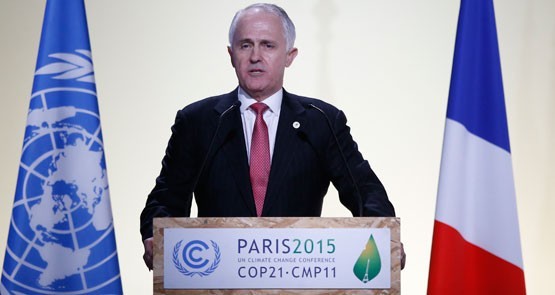
Day one of the Paris climate talks has concluded with Australia confirming one commitment, breaking another and making two surprise pledges (albeit one of which is a repackaging of funds). There’s been no time to feel jetlagged.
What does this all add up to? Some steps forward, but still not the strides needed to achieve the goals — which are rapidly becoming mainstream and which the Prime Minister has recognised — of avoiding 2 degrees warming by reducing emissions to net zero levels.
Let’s start with the good bits. Prime Minister Malcolm Turnbull announced Australia would ratify the second commitment period of the Kyoto Protocol. Ratifying a treaty we have already signed might not sound like a major step forward. But given that Australia let nine years lapse between signing and ratifying the first period of Kyoto, this is a signal to the rest of the world that Australia is taking its international commitments more seriously. Interestingly, within the Doha amendment to the Kyoto Protocol is Australia’s full 2020 target range — not just the 5% cut that the government talks about, but the commitment to raise the target, potentially to 15% or 25%, depending on conditions of global action that the Climate Change Authority says have been met.
Turnbull also announced a doubling of funding for clean energy research and development by 2020, as part of the 20-nation Mission Innovation pledge. This is accompanied by the Breakthrough Energy Coalition of 28 investors — including Microsoft founder Bill Gates, Facebook’s Mark Zuckerberg and Amazon CEO Jeff Bezos — that will back companies in the 20 countries to get clean energy technologies “out of the lab and into the market”.
Of course, deploying new technologies requires a supportive and stable investment environment, features that are absent from Australia’s power sector, thanks to the slashing of the Renewable Energy Target (RET) and the removal of a price that would end the ability of coal- and gas-fired generators to pollute for free. We have no exit program for old coal stations, and, beyond the reduced RET, no on-ramp for clean energy.
Turnbull also pledged $1 billion by 2020 to help poor and vulnerable countries access clean energy and protect themselves from the physical impacts of climate change (“climate finance”). It is encouraging the government recognises the need for this support, but this is less impressive than it might sound. For a start, these funds are being taken from the already shrunken aid budget. Moreover, $200 million annually merely returns nominal funding to the levels provided between 2010 and 2013. Australia, along with other developed countries, has promised to scale up climate finance from public and private sources to $100 billion annually. There’s no sign of any scale-up strategy here. Canada, by contrast, has scaled up its commitment to $2.5 billion.
Finally, Australia was reportedly going to sign up to the Fossil Fuel Subsidy Reform Communique endorsed by 30 other countries, including Canada, the United States and New Zealand. But it pulled out at the last minute. Previously, Australia has supported G20 statements for reform of “inefficient fossil fuel subsidies”, while defining subsidies to exclude any Australian policies such as the diesel fuel rebate.
That might not wash any longer. As the fossil fuel subsidy communique notes:
“The International Monetary Fund views that fossil fuel prices should reflect not only supply costs but also environmental impacts like climate change and the health costs of local air pollution.”
The Climate Institute has calculated that the polluting parts of the energy sector benefit from an annual carbon subsidy of $14 billion to $39 billion. The total carbon subsidy to electricity between now and 2030 would reach $165 billion to $500 billion.
So day one is a wrap: Australia has taken some steps forward, but recognising the need for net zero emissions means we need to be looking to modernise and clean up our economy. That requires more policy substance than is on offer yet.







‘…a doubling of funding for clean energy research and development by 2020…’
As long as it concentrates on renewable energy sources rather than wasted on trying to make coal ‘cleaner’.
“The leader of a nation of laggards”
I really have nasty thoughts whenever I hear ghunt using high school debating techniques to run rings around interviewers as he lies, lies and the lies some more.
What is truly upsetting is that he knows that he is lying and DOES NOT CARE, so long as it furthers his career.
Hunt’s interview on Lateline, and on ABC’s drive program, were appalling for his bald face lies, not only in declaring that Australia is leading the world but also for stating that Malcolm got a standing ovation for his support of Kyoto 2.
It appears the porkies are flying thick & fast on the government’s front bench at the moment, not merely restricted to the fanciful Hunt.